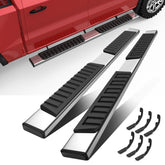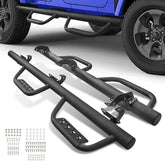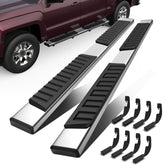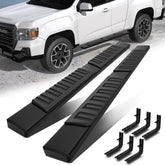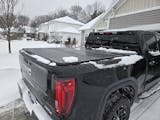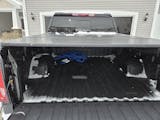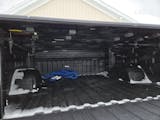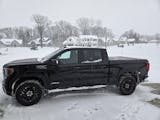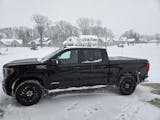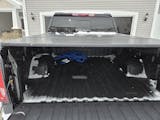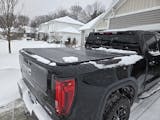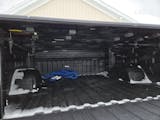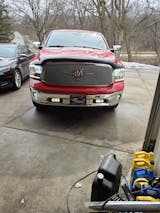Do Running Boards Cause Rust?
Running boards are becoming a must-have accessory for more and more trucks or SUVs. Not only do they provide you with an extra step to help you get in and out of the vehicle, but they also enhance the overall appearance of your vehicle. When you are planning to equip your vehicle with a set of running boards, you will consider its size, load-bearing capacity, and ground clearance. In addition, many of our customers have recently asked this question: "Do Running Boards Cause Rust?".
No one wants the product they spend money on to last a long time, especially when it comes to vehicles. In this article, we will answer this question for you and show you how to maintain and prevent your running boards from rusting.
Do Running Boards Cause Rust?
Whether the running boards will rust depends largely on the material of the running boards you purchased. Most running boards on the market are made of stainless steel or aluminum alloy, which will not cause rust by themselves. Manufacturers also use protective coatings to protect metal parts from rust when producing products.
But this does not mean that the running boards will not rust 100%. If they are not installed properly or exposed to the air for a long time, especially in areas with high salt content, it may cause rust problems.

Will running boards make your car rust? Now, most vehicles have pre-drilled holes to install running boards, so that car owners do not need to drill holes to install them. So equipping your vehicle with running boards will not make your vehicle more prone to rust.
How to reduce the risk of rust on running boards?
How can we reduce the risk of rust on our running boards in our daily lives? It is not a complicated matter. We only need to follow the points:
1. Clean regularly
One of the most effective ways to prevent rust is to keep your vehicle clean. When you are driving, road salt, dust and dirt will adhere to your running boards, especially in winter, because salt is common on the road in winter, which can easily corrode your equipment. Regularly cleaning the running boards and vehicle chassis can remove the dirt, salt, and debris that cause rust, which can greatly reduce the risk of rust.
Note: During the cleaning process, pay special attention to the area where the running boards connect to the vehicle, as these areas are more prone to rust.
2. Check for damage
Check the running boards regularly and carefully observe their surface for scratches, etc. If there are scratches on the coating, the metal part of the running board will be exposed, which is very easy to rust if it is in a humid environment for a long time. If you find that the protective coating in any area is damaged, apply anti-rust sealant or paint to prevent rust.
Note: If the connection point between the running board and the vehicle is loose, tighten the loose bolts and make sure the running board is firmly installed, which will help prevent moisture retention.

3. Apply a protective coating
For added protection, consider applying a rust-proof spray or primer to the running boards mounting area. This helps create an extra barrier between the metal and any moisture or debris that could cause rust.
4. Use rust-proof materials
If you are purchasing running boards for your vehicle, consider choosing running boards made from rust-proof materials such as aluminum or stainless steel. These materials are less likely to rust even when exposed to harsh conditions. In addition, make sure the mounting hardware, such as bolts and brackets, is also made from rust-proof materials or coated with a protective coating.
In short, if you don't want your running boards to rust quickly, then it must be inseparable from your care and maintenance.

Common Running Board Materials
As mentioned earlier, using rust-resistant materials can help reduce the risk of rust on running boards. Here are three common materials used to make running boards:
- Steel: Steel is one of the most common materials used for running boards because of its strength and durability. However, steel is very susceptible to rust if it is not properly coated with a rust-resistant coating. When the running board is scratched or peeled, the exposed steel will rust over time.
- Aluminum: Aluminum is rust-resistant, making it a popular choice for running boards. While aluminum will not rust like steel, it will corrode when exposed to road salt or other corrosive elements. However, the corrosion process of aluminum is much slower and less destructive than that of steel.
- Stainless steel: Stainless steel running boards are highly resistant to rust and corrosion. The chromium content in stainless steel forms a protective oxide layer on the surface that prevents rust. Stainless steel running boards are generally more expensive, but they provide better long-term protection against rust.
Choosing high-quality running boards made of rust-resistant materials can significantly reduce the risk of rust on your vehicle. Proper coatings and finishes, such as powder coating or paint, can protect metal running boards from rusting.
Conclusion
From the perspective of the running boards itself, it will not rust under normal use. But it still requires proper maintenance, which will help reduce the risk of rust and extend its service life. If you are planning to buy rust-free running boards, choose the aluminum running boards suitable for your model on MOSTPLUS and upgrade the appearance of your vehicle.
Featured Products
- $198.99
- $198.99
- Unit price
- / per
- $198.99
- $198.99
- Unit price
- / per
- $203.99
$203.39- $203.99
- Unit price
- / per
- $198.99
- $198.99
- Unit price
- / per
